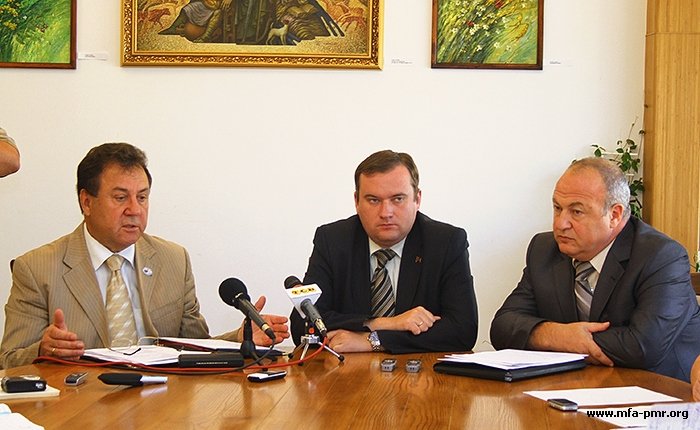Today, the Ministry of Foreign Affairs of the PMR hosted joint press-conference of Minister of Foreign Affairs of the PMR Vladimir Yastrebchak, Chairperson of the Central Election Committee of the PMR Petr Denisenko, and Minister of Justice Sergey Stepanov dedicated to the 5th anniversary of a Nation-Wide Referendum on Independence and choice of Pridnestrovie's strategic development vector.
Vladimir Yastrebchak reminded journalists of the political situation which was developing around Pridnestrovie in 2005-2006 and created the need for carrying out this referendum. The Minister noted, in that period internal policy situation in Ukraine caused the change in the policy of Kiev and in the line of Pridnestrovie. During 2005, political and economic pressure on Pridnestrovie was growing. The diplomat stressed, this took place to some extent under the influence of Brussels and Washington. Practical result of this policy was revision of the procedure of export and import activity for Pridnestroien enterprises. According to Vladimir Yastrebchak, the so-called “new rules” introduced by Kishinev and Kiev cannot be classified otherwise than economic blockade of the Pridnestrovien Moldavian Republic. “Behind these economic measures of enforcement one could clearly see one political goal – to enforce Pridnestrovie to settle relations with Moldova on conditions of the latter,” the diplomat noted. He reminded that earlier, in July 2005, a law was unilaterally adopted in Moldova, which outlined the status of the “Pridnestrovien region”, if say in Kishinev terms. Therefore, as it was marked by the Minister, from the very beginning issues of economic blockade haven't been regarded in Tiraspol apart from political component. “Special Congress of Deputies of all levels of Pridnestrovie established at the end of March 2006 took decision on the preparation and conduct of a Nation-Wide Referendum. Thus, issues put to a referendum were the result of a broad public discussion,” the diplomat stressed.
Vladimir Yastrebchak also told about major results of the referendum for Pridnestrovie's foreign policy. In his words, Tiraspol reiterated its position in negotiations which is based on the fact that the Pridnestrovien Moldavian Republic is a sovereign independent state, and achieving recognition of this fact by international community is a defining goal for the people of Pridnestrovie. The next step of Pridnestrovie, as the Minister noted, will be the question of free association with the Russian Federation. Vladimir Yastrebchak stressed that this will become possible only after the status of an internationally recognized independent state is obtained. “This is the basis of positions of Pridnestrovie in negotiations over the last years and it will remain the same in future as well,” the head of the Pridnestrovien diplomacy told.
Vladimir Yastrebchak noted that outcome of 2006 Referendum allowed embarking to concrete practical work of all governing institutions in line of harmonization of the Pridnestrovien legislation with the Russian one. For PMR's MFA the results of the given referendum became also the basis of closer coordination of foreign policy efforts with the Russian side. Vladimir Yastrebchak told that intensification of cooperation with Russia in line of foreign policy began long before the referendum. The Minister recalled of an all-round support rendered to Pridnestrovie on the part of the Russian Federation since the first days of blockade. Prior to referendum, Smirnov-Zhukov Protocol and a number of interdepartmental documents concerning bilateral Russian-Pridnestrovien cooperation were signed. “All this preceded referendum, but its results considerably reinforced our joint work,” the Minister told. He noted that results reached in that period even now remain legal and practical basis for Russian-Pridnestrovien interaction.
Petr Denisenko noted that discussion of issues concerning vector of development of the Pridnestrovien society started as far back as 1989. At that time, in view of the need to protect civilian and human rights of the Pridnestroviens from nationalists of Moldova, a question about creation of Pridnestrovie's own statehood arose. Referendum was held at different times in all towns and villages of Pridnestrovie. The first to vote was Rybnitsa, on December 3, 1989. As it was marked by Petr Denisenko, in 1989-1990, 97.3% of the Pridnestrovien people who participated in voting spoke in favor of creation of the Republic. Results of the first referendum made it possible to hold Congress of Deputies of all levels of Pridnestrovie at which popular representatives proclaimed creation of the Pridnestrovien Moldavian Soviet Socialist Republic. On December 1, 1991, referendum on independence took place in Pridnestrovie. Petr Denisenko stressed that Pridnestrovien people voted for independence as early as 20 years ago, and during 2006 Referendum they reiterated their choice. Chairperson of the Central Election Committee also noted that in the course of these years there is absolute consensus on the issue of independence within the Pridnestrovien society. Results of the referendums prove this. In 1991, “in favor” spoke 97.7% of the voters who participated in the voting, in 2006 – 97.2%. Moreover, voter turnout during these two referendums exceeded 78% of all the registered voters.
Petr Denisenko noted that 7 referendums took place in Pridnestrovie. Not all of them were successful (in 2003 referendum on private property in land failed because of low turnout), but authorities have never contested their results. “The will of the people is a suprema lex in Pridnestrovie,” stressed head of the CEC. Responding to journalists' questions, he cited figures of voter turnout at local elections, elections to the Supreme Soviet and at presidential elections. At local elections voter turnout in the republic is on the average about 47%, to the Supreme Soviet – approximately 55%, at presidential elections voter turnout usually does not exceed 68% of the number of those registered. At nation-wide referendums dealing with the lot of the republic and the life of the whole people, voter turnout approaches 80%. Petr Denisenko said that in 2006 many Pridnestroviens came back from abroad with the only purpose – to take part in voting, to cast their votes for independence and association with Russia.
During the press-conference, heads of government institutions responded to journalists questions.








